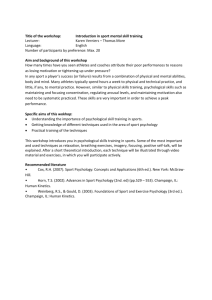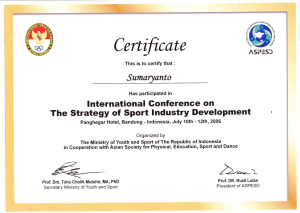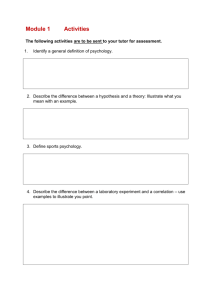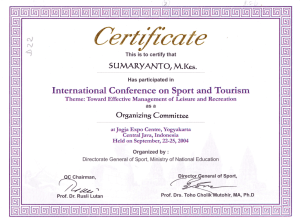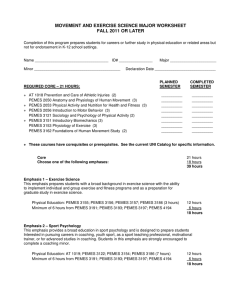California State University, Fresno What is Sport Psychology?
advertisement
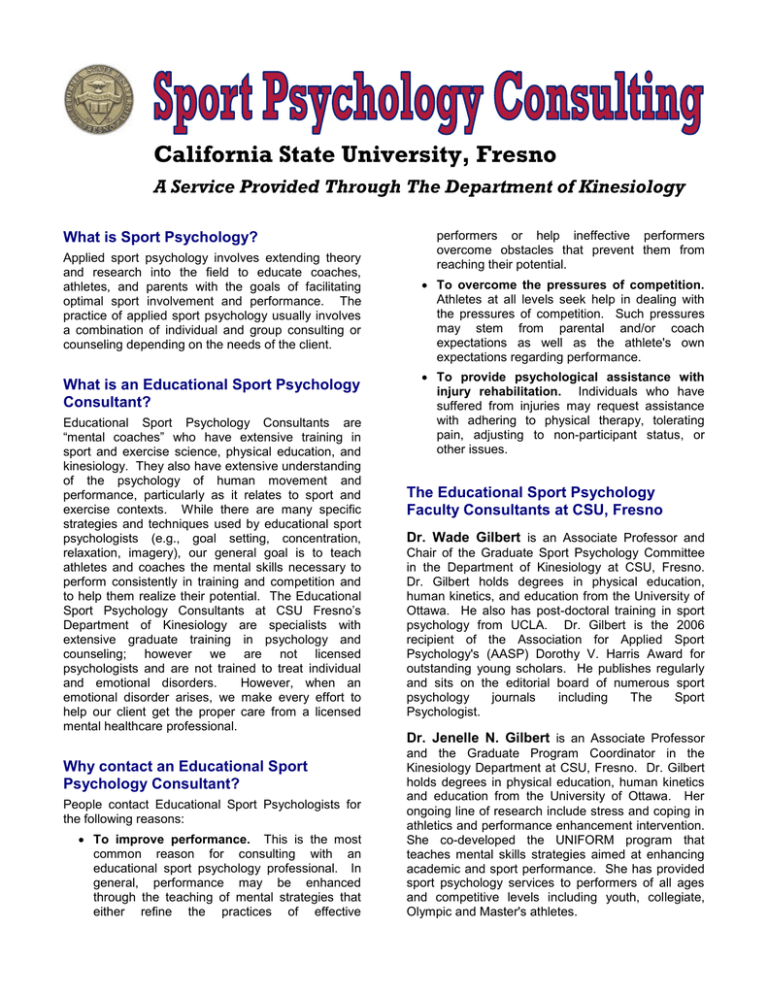
California State University, Fresno A Service Provided Through The Department of Kinesiology What is Sport Psychology? Applied sport psychology involves extending theory and research into the field to educate coaches, athletes, and parents with the goals of facilitating optimal sport involvement and performance. The practice of applied sport psychology usually involves a combination of individual and group consulting or counseling depending on the needs of the client. What is an Educational Sport Psychology Consultant? Educational Sport Psychology Consultants are “mental coaches” who have extensive training in sport and exercise science, physical education, and kinesiology. They also have extensive understanding of the psychology of human movement and performance, particularly as it relates to sport and exercise contexts. While there are many specific strategies and techniques used by educational sport psychologists (e.g., goal setting, concentration, relaxation, imagery), our general goal is to teach athletes and coaches the mental skills necessary to perform consistently in training and competition and to help them realize their potential. The Educational Sport Psychology Consultants at CSU Fresno’s Department of Kinesiology are specialists with extensive graduate training in psychology and counseling; however we are not licensed psychologists and are not trained to treat individual and emotional disorders. However, when an emotional disorder arises, we make every effort to help our client get the proper care from a licensed mental healthcare professional. Why contact an Educational Sport Psychology Consultant? People contact Educational Sport Psychologists for the following reasons: To improve performance. This is the most common reason for consulting with an educational sport psychology professional. In general, performance may be enhanced through the teaching of mental strategies that either refine the practices of effective performers or help ineffective performers overcome obstacles that prevent them from reaching their potential. To overcome the pressures of competition. Athletes at all levels seek help in dealing with the pressures of competition. Such pressures may stem from parental and/or coach expectations as well as the athlete's own expectations regarding performance. To provide psychological assistance with injury rehabilitation. Individuals who have suffered from injuries may request assistance with adhering to physical therapy, tolerating pain, adjusting to non-participant status, or other issues. The Educational Sport Psychology Faculty Consultants at CSU, Fresno Dr. Wade Gilbert is an Associate Professor and Chair of the Graduate Sport Psychology Committee in the Department of Kinesiology at CSU, Fresno. Dr. Gilbert holds degrees in physical education, human kinetics, and education from the University of Ottawa. He also has post-doctoral training in sport psychology from UCLA. Dr. Gilbert is the 2006 recipient of the Association for Applied Sport Psychology's (AASP) Dorothy V. Harris Award for outstanding young scholars. He publishes regularly and sits on the editorial board of numerous sport psychology journals including The Sport Psychologist. Dr. Jenelle N. Gilbert is an Associate Professor and the Graduate Program Coordinator in the Kinesiology Department at CSU, Fresno. Dr. Gilbert holds degrees in physical education, human kinetics and education from the University of Ottawa. Her ongoing line of research include stress and coping in athletics and performance enhancement intervention. She co-developed the UNIFORM program that teaches mental skills strategies aimed at enhancing academic and sport performance. She has provided sport psychology services to performers of all ages and competitive levels including youth, collegiate, Olympic and Master's athletes. Dr. Dawn K. Lewis is an Assistant Professor in the Kinesiology Department at CSU, Fresno. She earned her B.A. in psychology at Hunter College of the City University of New York, and M.S. and Ph.D. degrees in kinesiology with an emphasis in sport and exercise psychology at Michigan State University. Dr. Lewis' research and consulting focus on performance enhancement, athletes' recovery from sport injury (including the examination of social support structures, coping skills, and rehab adherence), and youth and adolescent development through sport. She has lead several injury support groups for athletes, and served as an independent reviewer of a coaches' certification program and a high school sport leadership program. Tim Hamel, M.S., is a Lecturer in the Kinesiology Department at CSU, Fresno. Mr. Hamel received his Bachelor of Arts degree in psychology from CSU, Fresno and his Master of Science degree in Kinesiology with an emphasis in applied sport psychology from CSU, Fullerton. While at Fullerton, he studied under top sport psychology consultant, Dr. Ken Ravizza. Mr. Hamel has extensive experience consulting with individuals and athletic teams from the high school, community, college, university, and professional levels. Educational Sport Psychology Consulting at CSU Fresno The faculty and students in the Graduate Sport Psychology Option are active in providing sport psychology services to a wide range of clients. We have collaborated with athletes, coaches, and administrators from youth sport to elite and professional sport. We offer two types of sport psychology service arrangements. Both arrangements allow for group and/or individual consulting sessions. Option A - Supervised Graduate Student Internships. Under this arrangement, students currently enrolled in the graduate Sport Psychology Option provide educational sport psychology services under the direct supervision of the sport psychology faculty. Typically, there is no charge for this service because it is a training opportunity for the graduate students who receive independent study or internship units towards their degree. Students, faculty, and clients work closely together through the intervention. We have negotiated this type of arrangement with local sport organizations including a youth sport club, youth gymnastics, high school athletics, and college teams. Option B - Fee for Service with Sport Psychology Faculty. Under this arrangement, prospective clients negotiate fees and performance enhancement services to fit their specific needs and schedule. Once a client makes contact, an initial no-cost onehour meeting is scheduled between the client and an educational sport psychology faculty member. This meeting is used to discuss the client's situation and determine if there is a fit between the client's needs and the faculty member's skills and availability. To discuss sport psychology services under one of these arrangements, contact: Dr. Wade Gilbert, Sport Psychology Committee Chair 5275 N. Campus Drive, M/S SG28, Fresno, CA 93740-8018 wgilbert@csufresno.edu, (559) 278-5170
